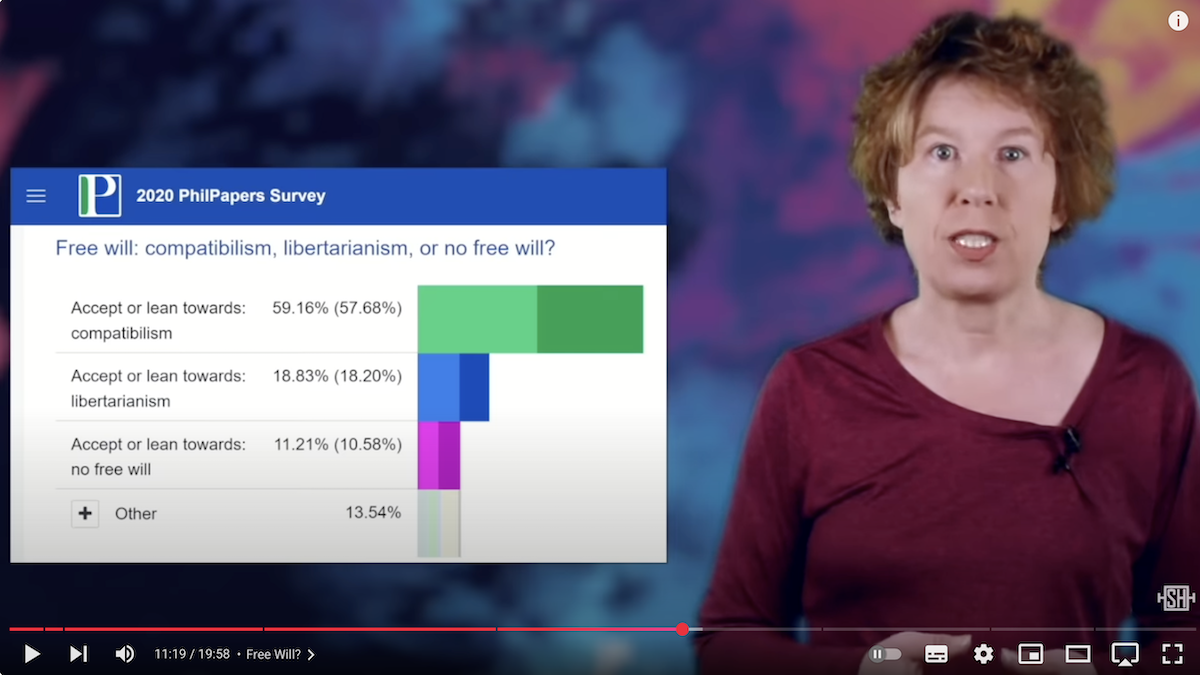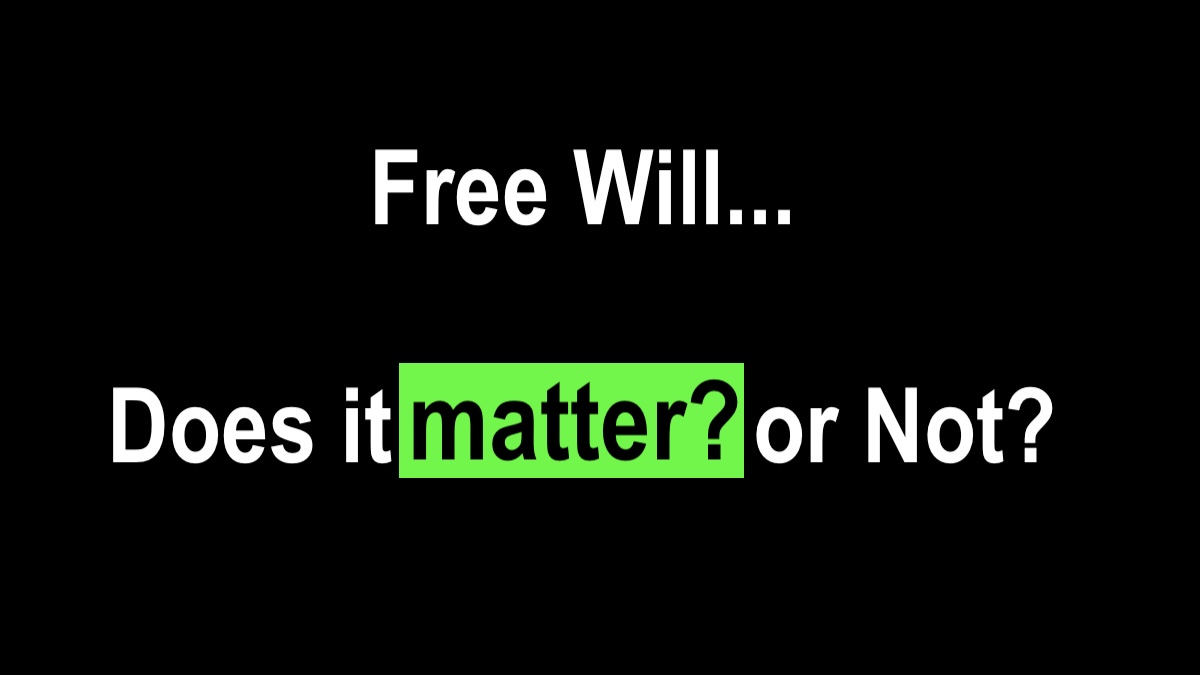“Yes I have free will; I have no choice but to have it.” ― Christopher Hitchens
What about “Free Will”… Do humans have it, or not? Will AGI/ASI have it, or not? Does it matter, or not?
We break it down to five (5) questions:
1. What is “Free Will”?
2. Do Homo sapiens (Humans) have Free Will, or not?
3. Does the answer matter?
4. Will Machine intelligence (AGI/ASI) have Free Will, or not?
5. Does the answer matter to humans, or to the ASI/AGI?
1. What is “Free Will”?
Free Will – Wikipedia
Free will is the capacity or ability to choose between different possible courses of action.[1] There are different theories as to its nature.
Free will is closely linked to the concepts of moral responsibility, praise, culpability, and other judgements which apply only to actions that are freely chosen. It is also connected with the concepts of advice, persuasion, deliberation, and prohibition. Traditionally, only actions that are freely willed are seen as deserving credit or blame. Whether free will exists and the implications of whether it exists or not constitute some of the longest running debates of philosophy. Some conceive of free will as the ability to act beyond the limits of external influences or wishes.
Some conceive free will to be the capacity to make choices undetermined by past events. Determinism suggests that only one course of events is possible, which is inconsistent with a libertarian model of free will.[2] Ancient Greek philosophy identified this issue,[3] which remains a major focus of philosophical debate. The view that posits free will as incompatible with determinism is called incompatibilism and encompasses both metaphysical libertarianism (the claim that determinism is false and thus free will is at least possible) and hard determinism (the claim that determinism is true and thus free will is not possible). Another incompatibilist position is hard incompatibilism, which holds not only determinism but also indeterminism to be incompatible with free will and thus free will to be impossible whatever the case may be regarding determinism.
In contrast, compatibilists hold that free will is compatible with determinism. Some compatibilists even hold that determinism is necessary for free will, arguing that choice involves preference for one course of action over another, requiring a sense of howchoices will turn out.[4][5] Compatibilists thus consider the debate between libertarians and hard determinists over free will vs. determinism a false dilemma.[6] Different compatibilists offer very different definitions of what “free will” means and consequently find different types of constraints to be relevant to the issue. Classical compatibilists considered free will nothing more than freedom of action, considering one free of will simply if, had one counterfactually wanted to do otherwise, one could have done otherwise without physical impediment. Many contemporary compatibilists instead identify free will as a psychological capacity, such as to direct one’s behavior in a way responsive to reason, and there are still further different conceptions of free will, each with their own concerns, sharing only the common feature of not finding the possibility of determinism a threat to the possibility of free will.[7]
2. Do Homo sapiens (Humans) have Free Will, or not?
Here are the statistics of belief. Compatibilism vs. Incompatibilism

Some physicists believe that Humans do NOT have Free Will.
A physicist is a scientist who specializes in the field of physics, which encompasses the interactions of matter and energy at all length and time scales in the physical universe.[1][2]Physicists generally are interested in the root or ultimate causes of phenomena, and usually frame their understanding in mathematical terms. They work across a wide range of research fields, spanning all length scales: from sub-atomic and particle physics, through biological physics, to cosmological length scales encompassing the universe as a whole. The field generally includes two types of physicists: experimental physicists who specialize in the observation of natural phenomena and the development and analysis of experiments, and theoretical physicists who specialize in mathematical modeling of physical systems to rationalize, explain and predict natural phenomena.[1] Physicists can apply their knowledge towards solving practical problems or to developing new technologies (also known as applied physics or engineering physics).[3][4][5]
Here is an example… Sabine Hossenfelder, Physicist
“You don’t have free will, but don’t worry.”
In this video I explain why free will is incompatible with the currently known laws of nature and why the idea makes no sense anyway. However, you don’t need free will to act responsibly and to live a happy life, and I will tell you why. 0:30 Free will as the possibility to select a future 1:21 Free will is incompatible with the laws of nature 3:02 Chaos and quantum mechanics make no difference 3:50 Free will is nonsense 4:28 Other definitions of free will 6:32 What is really going on 6:58 Reacting to a prediction is not free will 8:00 Free will is unnecessary for moral behavior 9:30 How to live without free will
3. Does the answer matter?
A biologist and info-tech-multimedia specialist and entrepreneur opinion (not a physicist, nor mathematician).
- It is easy to assume and understand that we humans CAN and DO make decisions.
- It is not easy to understand Incompatibilism, the philosophical view that “Free Will” is incompatible with determinism.
- However in the real, physical world in which we live, it is our decisions that really matter, and our freedom to make decisions about our own life (e.g. freedom) as long as it does not violate laws and moral behavior.
4. Will Machine intelligence (AGI/ASI) have Free Will, or not?
- Let’s assume for the moment the answer is NO.
- Or, most probably not.
5. Does the answer matter to humans, or to the ASI/AGI?
- IF a machine CAN make decisions (like humans do) but IF a machine has no Free Will (UNLIKE humans who do IF compatibilism is correct, or LIKE humans do NOT if Hard Incompatibilism is correct) THEN what’s the difference?
- The machine can still make plans and schemes and decisions for goals.
- These actions by the machines also can vary when same prompt is repeated, or RLHF is deployed etc., or with emergent autonomous behavior.
- Furthermore, evolution and natural selection is the force acting on survival of the species- so what has physics got to do with Safe AI?
- It is possible that consciousness is a matter related to “Quantum Biology”.
- Two Qs:
- Would AGI/ASI machine have Free Will or not? and
- Would it matter anyway?
- The answers could be:
- NO, and
- YES and NO.
- YES. IF humans DO engineer mathematically provable Safe AI with physical and electronic inventions before it is too late. or
- NO. IF humans DO NOT engineer former- because then we lose control and will all be dead anyway. What do you think?


